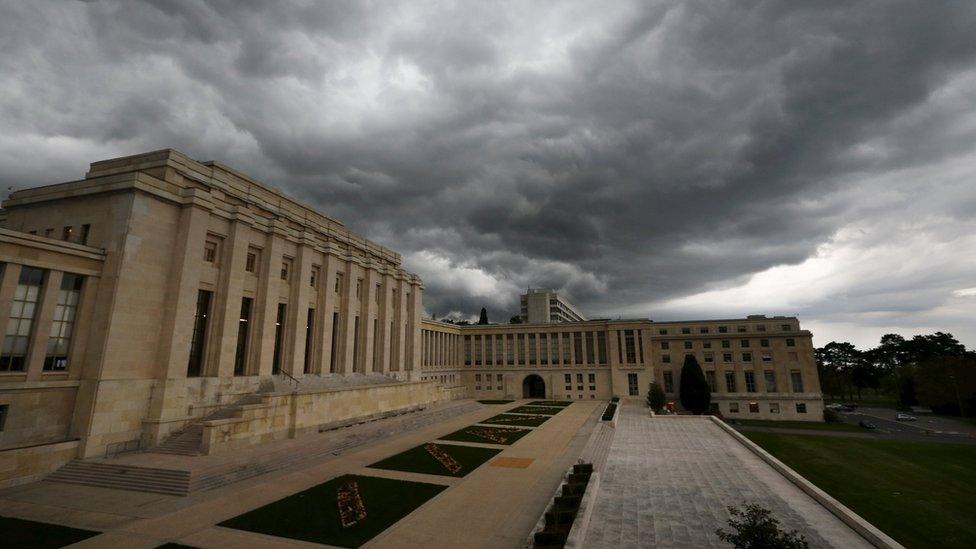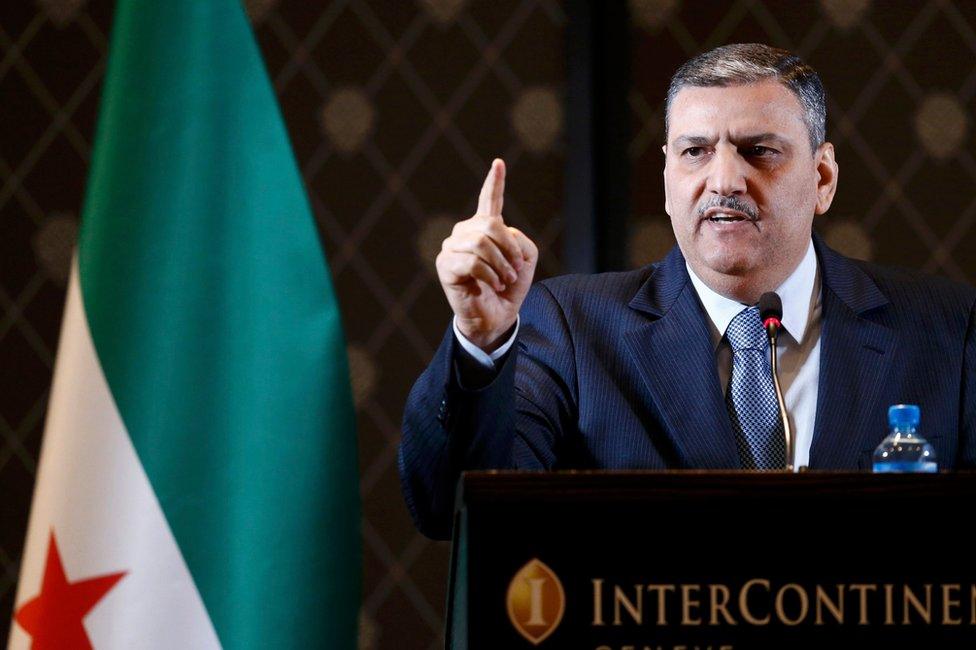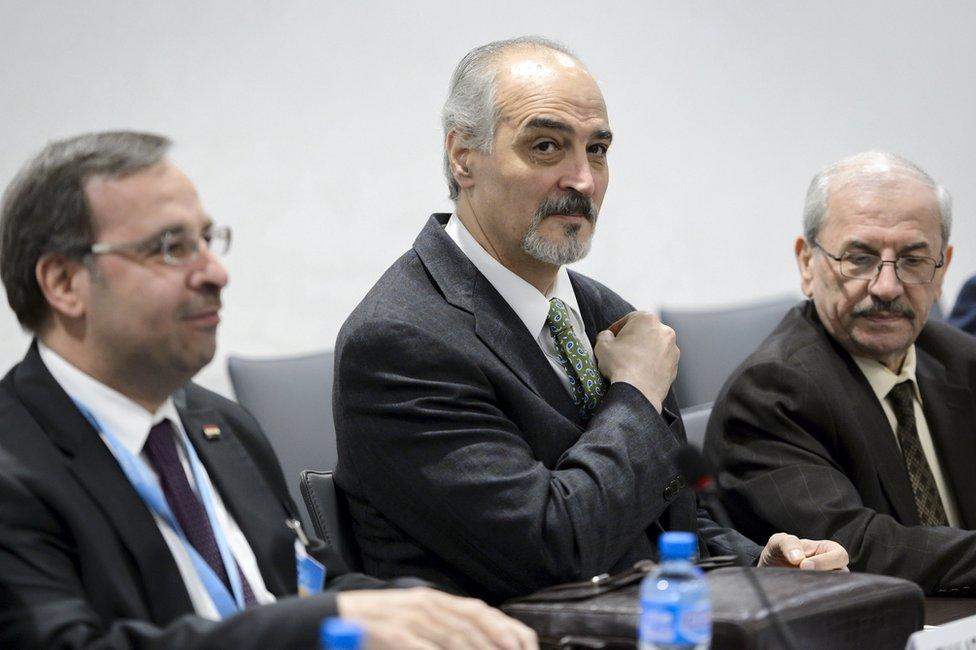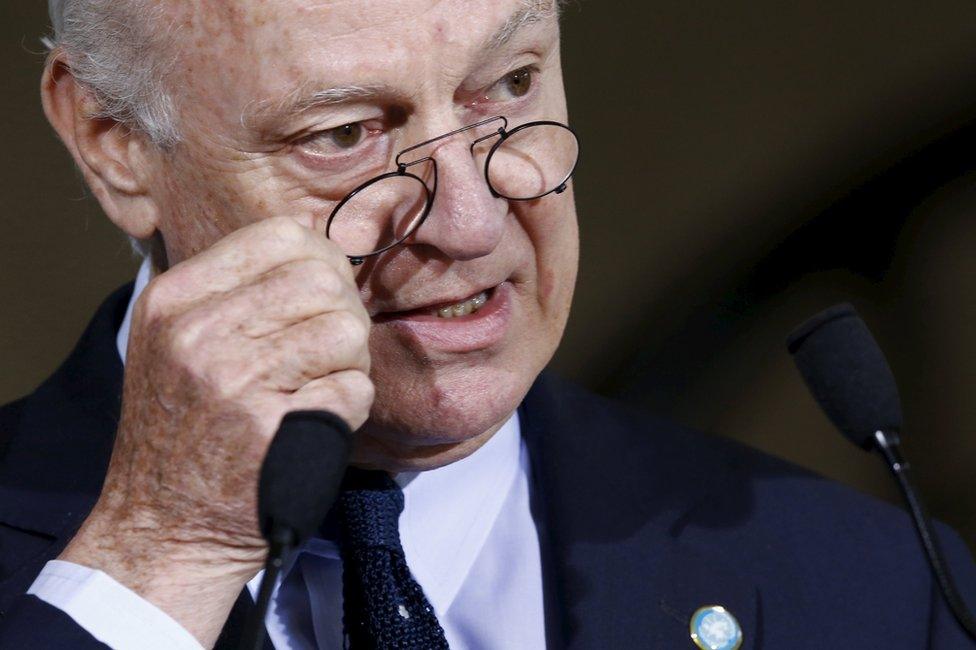Syria conflict: Has opportunity for peace been lost?
- Published

The UN-led Geneva talks are aimed at finding a political solution to end Syria's five-year war
It was "never going to be easy". That was the constant refrain of UN special envoy Staffan de Mistura as he tried, over the past several weeks, to get the Syria peace talks in Geneva off the ground.
But now, after a third and particularly acrimonious round, in which once again little progress was made, the indirect negotiations appear to have collapsed, despite Mr de Mistura's best efforts.
He is expected to announce that the talks will somehow continue, with only one of the two key negotiating parties still in Geneva.
Mr de Mistura told Swiss television that the situation in Syria was far too serious to drop, suggesting that the actual death toll in the five year conflict was 400,000, far higher than the UN's official estimate of between 250,000 and 300,000.
But the Syrian opposition High Negotiations Committee (HNC), angered by lack of progress on its two key demands - humanitarian aid to besieged areas, and release of political detainees - announced on Monday that it would suspend its formal participation in the talks. It said team members would stay in their Geneva hotels for "technical discussions".
By Thursday, as fighting on the ground in Syria intensified, opposition leaders were heading to Geneva airport.
"We don't see a serious partner here in Geneva, so it's no use sitting here," said the HNC's chief spokesman, Salim al-Muslat.
Bitter rhetoric
Indeed it was hard, listening to the two negotiating teams, to detect any genuine commitment to peace talks.
The Syrian government's chief negotiator, Bashar Jaafari, was regularly dismissive of the HNC representatives, accusing them variously of "sulking" and of being linked to terrorist groups.

Riad Hijab declared that opposition could not take part in the talks while people were dying
Mr Jaafari also appeared to have offered virtually nothing in the way of ideas for a transitional government - the key goal of the talks - and instead spent a good deal of one meeting with UN diplomats complaining about Israel's occupation of the Golan Heights.
Meanwhile, the HNC's chief co-ordinator, Riad Hijab, called a news conference in which he said the Syrian people would "never give up, never forgive" President Bashar al-Assad and would "fight with stones" if necessary.
Such was the bitterness of the rhetoric that one Western diplomat, arriving for a last ditch meeting at the opposition's hotel, was overheard wondering how many more "tirades" he would have to listen to that day.
Faint hopes dashed
It is a long way from that brief moment of optimism in February, when, after the intervention of the United States and Russia, a partial cessation of hostilities was agreed, and a trickle of aid began to arrive in a few besieged Syrian towns.
The hope then was that a lull in the fighting might create space for constructive peace talks.
Russia, long a supporter of Mr Assad, seemed ready to use its influence to support negotiations which could eventually see the president lose his power.

Chief government negotiator Bashar Jaafari accused the opposition of "absurd theatre"
It has not worked out that way. Instead, the peace talks have all but collapsed, and the cessation of hostilities is breaking down as fighting spreads.
Even senior diplomats seem unsure what the relationship now is between Moscow and Damascus.
Some opposition figures this week suggested President Assad was "ignoring" his chief support at his peril.
"Russia is the main key to change in Syria," said Mr Muslat. "I believe it takes a phone call from Putin to Assad, to [get him to] abide by the agreement [on the cessation of hostilities]. Assad should show some respect at least for his allies."
But, amid reports, external that Russia is moving military equipment back into Syria, some Western diplomats seem to be wondering how much Moscow can be relied on.
"Have they got influence [over Assad]?" asked one. "If they do then they are not applying it. If they don't then we can't rely too much on them."
'Plan B'
For months US negotiators, from John Kerry down, have said there is no "Plan B" if the peace talks fail.
But now, according to the Wall Street Journal, external, it seems there may be a Plan B after all, and it is not one that leads to the negotiating table.
Washington, it is claimed, is ready to provide opposition forces with much more sophisticated weapons, in order to strengthen their hand against President Assad's troops.

Staffan de Mistura says he will address the "next steps" in the peace talks on Friday
And all this week in Geneva, perhaps sensing that the moment was right, the opposition publicly called for such weapons.
So what could now avert Syria's descent into a sixth year of war?
"Changes on the ground will bring us back here," said Mr Muslat. "We have to see changes... our main concern is our people in besieged towns... and also detainees. We have not seen even one person out of those jails."
He added that the opposition would "not accept Assad or any people who are involved in killing Syrians" being part of any transitional government.
Publicly Staffan de Mistura says he plans to struggle on with the talks, suggesting that the opposition's departure from Geneva is "understandable…diplomatic posturing".
Privately, he is said to be pleading with Moscow and Washington, the co-chairs of the International Syria Support Group, to become much more active in the process. But with President Assad's negotiating team refusing even to discuss his departure from power, and opposition leaders already boarding planes home, it seems the talks are over, for the time being at least.
Until there is a major improvement on the ground, the opposition says it will not return.
And that, diplomats suggest, could mean another year or more of war, another million refugees, and more thousands of Syrians killed.
Last December, a very senior aid official, who had just returned from an assessment mission to Syria, was asked about the country's recovery, should peace talks get off the ground.
"The society? The social infrastructure?" he said. "In my opinion, it's already gone."